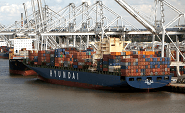Government/Policy

March 14, 2025
Miller on Trade: USTR proposes increased port fees for Chinese vessels
Written by Stephen Miller
The US Trade Representative (USTR) has drafted a proposal targeting the Chinese shipbuilding industry. It sets elevated port fees for any maritime shipping company associated with Chinese-built vessels.
By association, the USTR includes even the use of one ship built in or on order from China in an entire fleet.
The fees promulgated on the proposal range from $500,000-$1.5 million per port call depending upon the level of Chinese vessel usage regardless of the commodity being on board.
In theory, these fees would increase the freight rates for all products entering or leaving US ports. Needless to say, the effects on prices for imported materials and goods would raise costs to consumers and industries by incalculable amounts. Likewise with exports.
Reasoning?
The intent of this draconian proposal is to strengthen the US domestic shipbuilding industry because the Chinese have been operating unfairly, according to the USTR and US labor unions.
However, they do not explain what is meant by unfair. If this proposal is enacted by President Trump, it would amount to basically a declaration of war against China at the expense of the American public.
This proposal, now open to public comment, would have the effect of raising prices on imports of steel, scrap, and other steelmaking raw materials as most container or bulk ocean fleets have some Chinese-built vessels in use or on order. They would incur these extra charges.
Exporter responds
According to a large US exporter, the freight rate on a handy-max bulk carrier of ferrous scrap would probably double.
He also added that to use a US-flagged, non-Chinese-built vessel is very difficult: “You can’t really find one.”
The exporter went on the say he believes this proposal “can’t happen.” He asserted it would disrupt all international shipping to everybody’s detriment.
Too much pain?
If the intent of this proposal is to strengthen the US-based shipbuilding industry, it’s hard to justify this type of sacrifice on the part of the American society.
It will take years to grow this industry to where it could support the international economic activity of the US.
The US has not built a new tanker since 2017 and a liquified natural gas carrier since 1980, according to Lloyd’s Intelligence.
The international shipping community is taking this potential situation seriously.
According to sources within the community, some companies are booking freight forward to ensure they can perform on their commitments despite the increased port fee potential.
However, they have included a “mutual cancellation clause” without penalty, in case the proposal is not put into effect.
Is it viable?
Can this proposal become law?
It’s hard to imagine it could with all the collateral damage it would cause.
But take a look where we are now with tariffs. There definitely could be winners and losers with the recent changes in trade policies. Tilting too far for one particular industry could come at the expense of many others.







